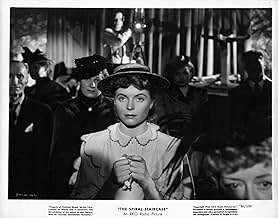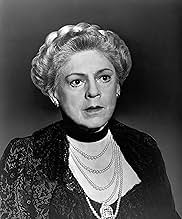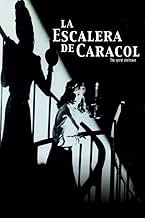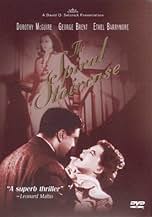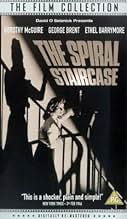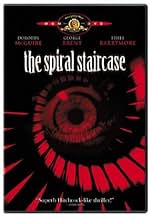AVALIAÇÃO DA IMDb
7,3/10
12 mil
SUA AVALIAÇÃO
Adicionar um enredo no seu idiomaIn 1916, a shadowy serial killer is targeting women with "afflictions"; one night during a thunderstorm, the mute Helen feels menaced.In 1916, a shadowy serial killer is targeting women with "afflictions"; one night during a thunderstorm, the mute Helen feels menaced.In 1916, a shadowy serial killer is targeting women with "afflictions"; one night during a thunderstorm, the mute Helen feels menaced.
- Direção
- Roteiristas
- Artistas
- Indicado a 1 Oscar
- 2 vitórias e 2 indicações no total
Erville Alderson
- Dr. Harvey
- (não creditado)
Ellen Corby
- Neighbour
- (não creditado)
Myrna Dell
- Murder Victim
- (não creditado)
George Holmes
- The Killer's 'Shadow'
- (não creditado)
Stanley Price
- Starry-eyed Man
- (não creditado)
Robert Siodmak
- The Killer's 'Eye'
- (não creditado)
Richard Tyler
- Freddy
- (não creditado)
Charles Wagenheim
- Desk Clerk
- (não creditado)
- Direção
- Roteiristas
- Elenco e equipe completos
- Produção, bilheteria e muito mais no IMDbPro
Avaliações em destaque
For sheer mastery in the art of black and white photography and its ability to provide the shadowy atmosphere necessary for mood, they don't come any better than this. The house alone is as much a part of the plot as the actors--but everything clicks...the acting, the script, the story, the direction and the brooding atmosphere that lets you know you're in for an intense and absorbingly suspenseful story. All of the suspense is relieved occasionally with just the right amount of humor. Particularly by Elsa Lanchester as the housekeeper who uses trickery to steal an extra bottle of liquor from the wine cellar. While thunder and lightning storms outside the mansion, we know that a serial killer is lurking on or near the premises, one who specializes in murdering women with physical afflictions. At the center of the story is Dorothy McGuire's character, a mute girl who lost her voice years ago during a traumatic experience. Around her are a number of people, all of whom become suspicious as the plot thickens--Kent Smith, Rhonda Fleming, George Brent, Ethel Barrymore and Gordon Oliver. Ethel Barrymore is especially good as a frightened old woman, bedridden and suspicious enough of everyone. For comparison, view the recent color TV adaptation, bland in overall effect. It will make you appreciate this black and white classic more than ever. As with most remakes, it doesn't stand a chance against the original.
My only complaint is that DOROTHY McGUIRE does not have much range in her expressions. Wide-eyed, but seldom wild, her restraint limits the amount of fear her character can express without using her voice. A more over-the-top performance might have been more useful, given the Gothic mood created so well by director Robert Siodmak. She is overshadowed by Ethel Barrymore as a bed-ridden invalid urging her to leave the house and Gordon Oliver, as the playboy step-brother who plays his role to the hilt. GEORGE BRENT does nicely for the most part, but seems too laid back in the final scenes to be as menacing as he is meant to be.
Still, well worth watching for its shadowy Victorian atmosphere alone.
My only complaint is that DOROTHY McGUIRE does not have much range in her expressions. Wide-eyed, but seldom wild, her restraint limits the amount of fear her character can express without using her voice. A more over-the-top performance might have been more useful, given the Gothic mood created so well by director Robert Siodmak. She is overshadowed by Ethel Barrymore as a bed-ridden invalid urging her to leave the house and Gordon Oliver, as the playboy step-brother who plays his role to the hilt. GEORGE BRENT does nicely for the most part, but seems too laid back in the final scenes to be as menacing as he is meant to be.
Still, well worth watching for its shadowy Victorian atmosphere alone.
Being one of the last truly great thriller/mystery classics I still had lingering on my must-see list; I cherished big expectations for "The Spiral Staircase". Perhaps even a little TOO big
Don't get me wrong, it's a fantastic film and a bona fide genre masterpiece, but somehow I expected even more suspense and moodiness! Let me just get out of my system that certain sequences inside the old dark house were a bit tedious and overdone. But hey, who's complaining, since the full rest of the film is pure perfection in terms of beauty, elegance, atmosphere and scenery. It's rather intriguing how certain films, like "Freaks" or "Peeping Tom" to name just two, caused so much controversy and scandal while "The Spiral Staircase" is widely considered as an untouchable landmark even though it features similar prohibited themes like voyeurism and murder victims with a disability. The opening sequence is almost too brilliant for words. A medium sized crowed gathers in a small theater for a silent movie screening while, on the floor above them, a crippled girl prepares herself to go to sleep. The utmost evil glazing eye watches her from inside the wardrobe and strikes exactly when she lifts the gown over her head. You can't get any more expressionistic than that. After that, "The Spiral Staircase" establishes itself as the sheer archetype of old dark house thrillers. The beautiful but mute Helen is a social worker in the secluded mansion of the ailing Mrs. Warren. A heavy thunderstorm rages outside, Mrs. Warren son and stepson argue over their life styles (and the lovely secretary Blanche) and the rest of the household staff either turns to alcohol or complains about the stubborn matriarch. Both Mrs. Warren and her doctor urge Helen to leave town. Could it be the maniacal killer is inside the house? This film is a rarity. Even though it doesn't require an Einstein brain to figure out the killer's identity, you honestly don't care that much and remain glued to the screen to admire how the Gothic atmosphere unfolds further. Director Robert Siodmak – a German immigrant in America following WWII – truly masters the cinematography and Victorian set pieces. He also manages to include the thunderstorm as an extra – and essential – supportive character. Speaking of the cast, I dare you to name a so-called 'damsel in distress' more amiable than Dorothy McGuire's Helen. She's a vulnerable angel, targeted by a frustrated and obsessive madman on a mission to rid the world of imperfection. Especially the women impress in "The Spiral Staircase" as I simply must also mention Ethel Barrymore as Mrs. Warren (nominated for an Oscar, even) and Elsa "Bride of Frankenstein" Lanchester as the maid with a taste for brandy.
THE SPIRAL STAIRCASE is one of the best known in the "old dark house" genre. These films typically feature a disparate group of characters who inevitably find themselves alone and trapped within a huge, rambling and spooky old house on the night of a storm, with a killer amongst them. What's notable about this outing is just how stylish it is: the story is nothing special, but the style makes it.
The story features a black-gloved killer (complete with POV shots) who hides in wardrobes and stalks his young, female victims and strangles them. In one of the movie's most infamous shots, the viewer sees a victim from the killer's point of view, and she's missing her mouth; symptomatic of his disturbed mind, and highly eerie with it. The whodunit aspect of the storyline is played up strongly, with some red herrings thrown into the mix, although it's pretty easy for a modern viewer to guess the identity of the murderer.
THE SPIRAL STAIRCASE features some decent performances, particularly from Dorothy McGuire, playing (unusually) a leading role as a mute. That the viewer becomes accustomed to her muteness and, eventually, even forgets about it is testament to her performance. Elsewhere in the cast, there's a barnstorming turn from grand old dame Ethel Barrymore who rules the roost from her deathbed, and a nicely comic performance from the BRIDE OF FRANKENSTEIN herself, Elsa Lanchester, as a drunk cook.
In the end, the film works because of the visual flourishes. As in a film noir, there's a lot of creeping about in the shadows, and silhouettes of various things and people play a big part. The emphasis on a deranged killer is a neat precursor to the later gialli and slasher films of the '70s and '80s, and there's little padding on the bare bones of the narrative. It's a good 'un.
The story features a black-gloved killer (complete with POV shots) who hides in wardrobes and stalks his young, female victims and strangles them. In one of the movie's most infamous shots, the viewer sees a victim from the killer's point of view, and she's missing her mouth; symptomatic of his disturbed mind, and highly eerie with it. The whodunit aspect of the storyline is played up strongly, with some red herrings thrown into the mix, although it's pretty easy for a modern viewer to guess the identity of the murderer.
THE SPIRAL STAIRCASE features some decent performances, particularly from Dorothy McGuire, playing (unusually) a leading role as a mute. That the viewer becomes accustomed to her muteness and, eventually, even forgets about it is testament to her performance. Elsewhere in the cast, there's a barnstorming turn from grand old dame Ethel Barrymore who rules the roost from her deathbed, and a nicely comic performance from the BRIDE OF FRANKENSTEIN herself, Elsa Lanchester, as a drunk cook.
In the end, the film works because of the visual flourishes. As in a film noir, there's a lot of creeping about in the shadows, and silhouettes of various things and people play a big part. The emphasis on a deranged killer is a neat precursor to the later gialli and slasher films of the '70s and '80s, and there's little padding on the bare bones of the narrative. It's a good 'un.
It's 1916 and a rash of women being killed who are 'imperfect' in the eyes of the killer whomever it is have both Dr. Kent Smith and bedridden dowager Ethel Barrymore concerned for the life of Dorothy McGuire, a beautiful, but mute servant girl in her house.
There's not much mystery to this film, it's not hard to guess the identity of the perpetrator, given the limited number in the cast. But The Spiral Staircase is one of the most atmospheric films ever done. Director Robert Siodmark made terrific use of the Victorian era set of the Warren house where 90% of the film is done. The centerpiece of course being The Spiral Staircase.
Two years before a deaf mute act won Jane Wyman an Academy Award, a lot of people, me included, felt Dorothy McGuire should have at least gotten a nomination for her role. She conveys so much in her portrayal, the meekness of her character and the gradual overwhelming fear that takes over her as she senses danger. Worse even when she fixes on the wrong individual as her menace.
Ethel Barrymore got an Academy Award nomination for Best Supporting Actress as the crotchety old woman who was in McGuire's keeping. But Ethel had won the same Oscar back in 1944 for None But The Lonely Heart. She lost in the finals to Anne Baxter for The Razor's Edge.
George Brent, Gordon Oliver, Rhys Williams, Rhonda Fleming, and Elsa Lanchester round out a good cast in one of the best atmospheric thrillers ever put on film.
There's not much mystery to this film, it's not hard to guess the identity of the perpetrator, given the limited number in the cast. But The Spiral Staircase is one of the most atmospheric films ever done. Director Robert Siodmark made terrific use of the Victorian era set of the Warren house where 90% of the film is done. The centerpiece of course being The Spiral Staircase.
Two years before a deaf mute act won Jane Wyman an Academy Award, a lot of people, me included, felt Dorothy McGuire should have at least gotten a nomination for her role. She conveys so much in her portrayal, the meekness of her character and the gradual overwhelming fear that takes over her as she senses danger. Worse even when she fixes on the wrong individual as her menace.
Ethel Barrymore got an Academy Award nomination for Best Supporting Actress as the crotchety old woman who was in McGuire's keeping. But Ethel had won the same Oscar back in 1944 for None But The Lonely Heart. She lost in the finals to Anne Baxter for The Razor's Edge.
George Brent, Gordon Oliver, Rhys Williams, Rhonda Fleming, and Elsa Lanchester round out a good cast in one of the best atmospheric thrillers ever put on film.
(Slight Spoilers} Effective turn of the century thriller set in New England about a killer on the loose murdering young women in the community who have imperfections in their mental or physical abilities. It's as if this murderer, like mimicking the actions a wolf pack, is attempting to cull out the sick and the weak reindeer or caribou to keep the rest of the herd strong and healthy for future breeding.
After murdering three unfortunate young women the murderer zeros in on young Helen Capel, Dorothy McGuire, a mute young women who works as a maid for the old and bed-ridden Mrs.Warren, Ethel Barrymore, at her estate outside of town.You begin to realize that the killer is in a way imperfect himself and by trying to eliminate those he deems imperfect is making up for his own imperfections.
Dorothy McGurie in one of her best roles as the mute and pretty Helen is stalked all through the movie by the killer in the shadows of the Warren Mansion and in the woods around it. There's a really scary scene early in the movie when the killer in the pouring rain follows Helen through the woods at night as she momentarily drops her key to the Warren home only to back off at the last minute when someone else unexpectedly arrives.
Ethal Barrymore is also very effective as the sick and bed-ridden Mrs. Warren who has some idea who the killer is and wants Helen to leave the house as soon as possible in order not to end up being his next victim. Both George Brent and Gordon Oliver are fine as the two step-brothers and sons of Mrs Warren in their roles as the serious Prof.Warren and his globe-trotting and fun-loving brother Steve. Who have very deep and troubling insecurities about themselves due to their late authoritative father's high standards that he set for them that they both couldn't live up too.
There's also Kent Smith as Dr. Parry who knows the real reason for Helen's loss of speech, she tragically saw her parents die in a house fire at a very young age. Dr. Perry wants to help Helen get her voice back by having her see a vocal specialist that he knows in Boston. It turned out at the end of the movie that it was shock therapy that did the trick.
Spine-tingling final when the killer comes out of the shadows and closes in on the terrified Helen for the kill chasing her up the spiral staircase of the Warren house. It's then the killer finds out only too late that he, not Helen, has gotten himself trapped in the cross-hairs of a deadly ambush.
After murdering three unfortunate young women the murderer zeros in on young Helen Capel, Dorothy McGuire, a mute young women who works as a maid for the old and bed-ridden Mrs.Warren, Ethel Barrymore, at her estate outside of town.You begin to realize that the killer is in a way imperfect himself and by trying to eliminate those he deems imperfect is making up for his own imperfections.
Dorothy McGurie in one of her best roles as the mute and pretty Helen is stalked all through the movie by the killer in the shadows of the Warren Mansion and in the woods around it. There's a really scary scene early in the movie when the killer in the pouring rain follows Helen through the woods at night as she momentarily drops her key to the Warren home only to back off at the last minute when someone else unexpectedly arrives.
Ethal Barrymore is also very effective as the sick and bed-ridden Mrs. Warren who has some idea who the killer is and wants Helen to leave the house as soon as possible in order not to end up being his next victim. Both George Brent and Gordon Oliver are fine as the two step-brothers and sons of Mrs Warren in their roles as the serious Prof.Warren and his globe-trotting and fun-loving brother Steve. Who have very deep and troubling insecurities about themselves due to their late authoritative father's high standards that he set for them that they both couldn't live up too.
There's also Kent Smith as Dr. Parry who knows the real reason for Helen's loss of speech, she tragically saw her parents die in a house fire at a very young age. Dr. Perry wants to help Helen get her voice back by having her see a vocal specialist that he knows in Boston. It turned out at the end of the movie that it was shock therapy that did the trick.
Spine-tingling final when the killer comes out of the shadows and closes in on the terrified Helen for the kill chasing her up the spiral staircase of the Warren house. It's then the killer finds out only too late that he, not Helen, has gotten himself trapped in the cross-hairs of a deadly ambush.
Você sabia?
- CuriosidadesRobert Siodmak: the close-ups of the killer's eyes and hands.
- Erros de gravaçãoWhen Helen first walks up the main staircase, she pauses to look at herself in the mirror. In the next shot as the camera slowly rolls backwards, she is still looking in the mirror, but there is no reflection of herself (just a painting designed to look like mirror).
- Versões alternativasThe MGM DVD has the opening and closing MGM logos in addition blacking out the RKO Pictures logo.
- Trilhas sonorasWaltz Op. 34 No. 2 in A minor
(uncredited)
Composed by Frédéric Chopin
[The first half of the piano accompaniment to the silent movie]
Principais escolhas
Faça login para avaliar e ver a lista de recomendações personalizadas
Detalhes
- Data de lançamento
- País de origem
- Idioma
- Também conhecido como
- No Silêncio das Trevas
- Locações de filme
- Empresas de produção
- Consulte mais créditos da empresa na IMDbPro
- Tempo de duração
- 1 h 23 min(83 min)
- Cor
- Proporção
- 1.37 : 1
Contribua para esta página
Sugerir uma alteração ou adicionar conteúdo ausente



